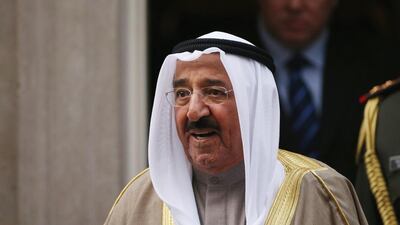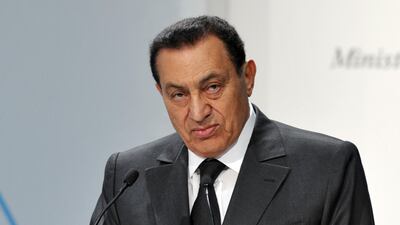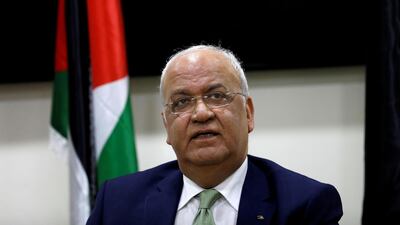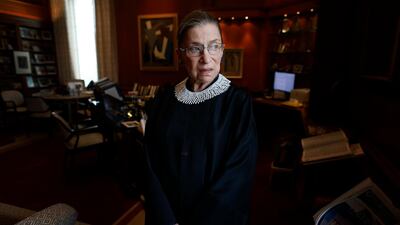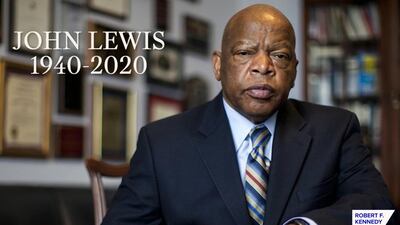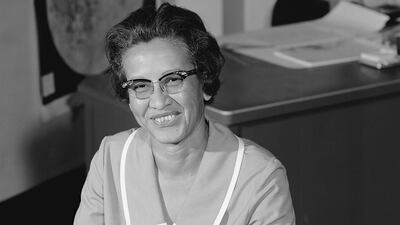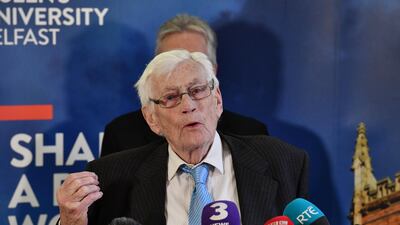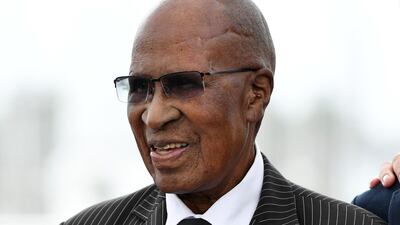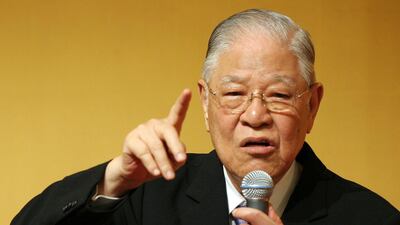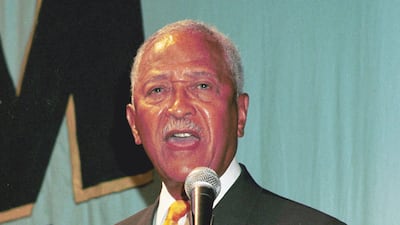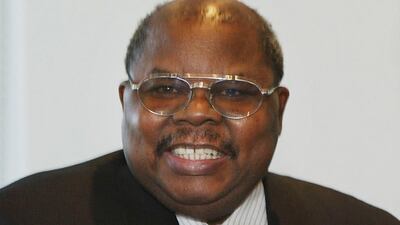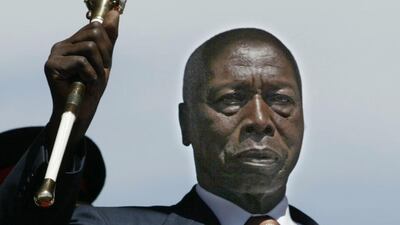Deaths dominated news headlines in 2020, but not all were caused by the Covid-19 pandemic. Among the many lives cut short this year were some that had simply run their course after leaving their mark on countries or fields of specialisation.
Sultan Qaboos
He was father figure to Oman's more than four million residents and an elderly statesman who many leaders across the region looked up to. After ruling for almost half a century, Sultan Qaboos is remembered as the great moderniser of Oman and an important mediator between neighbours, both in times of war and peace. He was the last surviving founding member of the Gulf Co-operation Council, formed in 1981 during a period of great uncertainty brought about by the onset of the Iran-Iraq War.
Sheikh Sabah Al Sabah
Sheikh Sabah Al Sabah ruled Kuwait since 2006 and had steered its foreign policy for more than 50 years. He was Kuwait's foreign minister for four decades, and served as prime minister before becoming emir. Throughout his career, Sheikh Sabah used his power to bolster diplomacy and preserve peace and stability in his home country and beyond.
Hosni Mubarak
He served as Egypt's president for 29 years, and was a former air force commander and a war hero. He was named vice president in 1975 and took over the presidency in 1981 after the assassination of Anwar Sadat. Mubarak escaped the attack on a military parade that killed Sadat and also survived at least six attempts on his life during his rule.
Mubarak was swept out of office by the Arab uprisings nine years ago. He was convicted of embezzlement along with his son in 2014 and was sentenced to three years in prison and fined millions of pounds. All three were eventually released for time already served. He was 91 years old when he died in February.
Saeb Erekat
Known as a veteran negotiator and Palestinian architect of the Oslo peace accords, Saeb Erekat died in Jerusalem's Hadassah hospital after developing Covid-19 and being put on a ventilator. The 65-year-old secretary general of the Palestine Liberation Organisation was at the heart of the framework of deals that started the Palestinian peace process, starting as deputy to Abdel Shafi in the talks that led Yitzhak Rabin, Yasser Arafat and Bill Clinton to meet at the White House in 1994 to sign the first Oslo Accords.
Ruth Bader Ginsberg
Justice Ruth Bader Ginsburg, a trailblazing feminist icon and a steadfast liberal voice on the United States Supreme Court since the early 1990s, died aged 87 after a lengthy battle with cancer. Ginsburg was only the second woman to serve on the Supreme Court, nominated for the position in 1993 by then-president Bill Clinton. A self-made woman hailing from a modest Jewish family, Ginsburg had to fight discrimination early on in her life. She was demoted from her previous job in 1954 when she became pregnant. "Not a law firm in the entire city of New York would employ me," she said. "I struck out on three grounds: I was Jewish, a woman and a mother."
She was a force to be reckoned with when it came to advancing women’s rights, and inspired a new generation of women's rights advocates to follow in her footsteps.
John Lewis
John Lewis was a lion of the US civil rights movement whose beating by Alabama state troopers in 1965 helped motivate opposition to rise up against racial segregation. He went on to have a long and celebrated career in Congress and died at the age of 80 after a long battle with pancreatic cancer.
Lewis was the last survivor of the Big Six civil rights activists, led by the Rev Martin Luther King Jr.
King was "the person who, more than any other, continued to influence my life, who made me who I was", Lewis wrote in his 1998 autobiography, Walking with the Wind.
Katherine Johnson
Katherine Johnson, a mathematician and the first woman to calculate rocket trajectories and Earth orbits for Nasa's early space missions, died at age 101 of natural causes.
She was one of the “computers” who solved equations by hand during Nasa’s early years and those of its precursor organisation, the National Advisory Committee for Aeronautics.
Johnson and other black women initially worked in a racially segregated computing unit in Hampton, Virginia, which was not officially dissolved until Naca became Nasa in 1958.
Johnson focused on aeroplanes and other research at first. But her work at Nasa's Langley Research Centre eventually shifted to Project Mercury, the nation’s first human space programme.
"Our office computed all the trajectories," Johnson told The Virginian-Pilot newspaper in 2012.
“You tell me when and where you want it to come down, and I will tell you where and when and how to launch it.”
In 1961, Johnson did trajectory analysis for Alan Shepard’s Freedom 7 mission, the first to carry an American into space. But Johnson considered her work on the Apollo moon missions to be her greatest contribution to space exploration, as her calculations helped the lunar lander to rendezvous with the orbiting command service module. She also worked on the Space Shuttle program before retiring in 1986.
Seamus Mallon
Seamus Mallon was a principal architect of the Good Friday agreement signed in 1998 that laid the foundations of Northern Ireland’s devolved government and a deputy leader of the Social Democratic and Labour Party (SDLP). He served as deputy first minister of Northern Ireland (1998-2001) in the power-sharing executive under David Trimble.
Mallon began his working life as a teacher, qualifying at St Joseph’s College of Education in Belfast and becoming head of St James’ primary school in Markethill. He was then drawn into the Irish civil rights movement and into politics because of the discrimination against Catholics that he had witnessed in his home town.
A committed nationalist aspiring to Irish unity, Mallon worked as an unpaid SDLP spokesman until he was elected to Westminster in 1986. He was known for speaking up about security force violence and police reform. Mallon retired from active politics in 2005, having already resigned as deputy leader of the SDLP in 2001.
Andrew Mlangeni
Andrew Mlangeni was the last surviving defendant of the Rivonia trial in which he, Nelson Mandela and seven others were sentenced in 1964 to life in prison for conspiring to overthrow the apartheid regime in South Africa by force. He died in July at the age of 95 after being admitted to a military hospital in Pretoria with an abdominal complaint.
On trial for their lives, the 10 defendants, six black, three white and one Indian, decided to use the proceedings to put apartheid in the dock of world opinion.
"We were a multiracial band of comrades whose aim was a non-racial South Africa,” Mlangeni recalled.
“We did not spend 26 years in prison so that public officials could steal from the people or take bribes. Corruption must be stamped out ruthlessly.”
After his release in 1989, he served as a member of parliament and lived in Soweto until his death.
Lee Teng-hui
Former Taiwanese President Lee Teng-hui, considered the "father of Taiwan's democracy" died in July at the age of 97 from multiple organ failure after being in hospital for nearly six months. He served as president of Taiwan from 1988 to 2000, and was credited with ending autocratic rule in favour of pluralism and democracy.
Throughout his life Lee took on multiple identities as a Japanese, Communist, Chinese, Christian and Taiwanese independence activist – in line with Taiwan's many changing facets.
His attempts to sever Taiwan from China sparked tensions with Beijing, which sees the island as part of its territory to be reunited one day.
David Dinkins
David Dinkins was an American politician, lawyer, and author who became New York City’s first and only black mayor. Described by many as the the right man at the wrong time, he served a single term from 1990 until 1993 during a period of chaos for New York, which consumed by a then-huge deficit of $1.8bn. His political personality was described as a cautious and dignified conciliator. During his short time in office, he pledged to be “the mayor of all the people” in what he had come to call this “gorgeous mosaic” of a city, “the greatest city of a great nation, to which my ancestors were brought, chained and whipped, in the hold of a slave ship”.
He died at his home in November at the age of 93.
Benjamin Mkapa
Banjamin Mkapa served as Tanzania's the third president after the country gained independence from Britain in 196 . His presidency from 1995 to 2005 marked a significant time in the country, as it represented the first phase of Tanzanian multi-party democracy. It was also a pivotal time for economic reform, such as the privatisation of state enterprises and the liberalisation of the economy. Mkapa was credited with investing significantly in improving travel infrastructure.
Mkapa also held several cabinet posts, such as foreign minister and information minister. He also served as ambassador to the US before he was elected president.
He died in hospital in July from an undisclosed illness. He was 81.
Daniel Arap Moi
Former Kenyan President Daniel Arap Moi, who died in February aged 95, and was Kenya's longest-serving leader, ruling from 1978 to 2002.
Moi won elections in 1992 and 1997 amid divided opposition, but was pressured into retirement when term limits forced him to step down in 2002.
He has been described by critics as a dictator, but Kenya was more stable than many other countries in the region emerging from colonial rule.
He retained some symbols of democracy such as regular parliamentary elections but government interference was so pervasive that Kenya was a virtual dictatorship, where Moi gradually removed parliament's authority and exercised almost unlimited power.
Moi succeeded in keeping Kenya relatively stable compared to many of its troubled neighbours, worked for regional peace and eventually introduced political pluralism.
But he failed to rescue the nation's economy and tackle deepening poverty and rampant political corruption.

